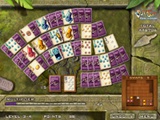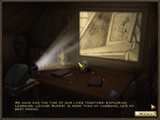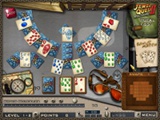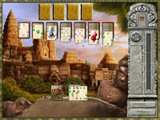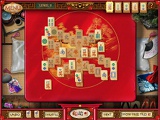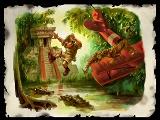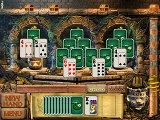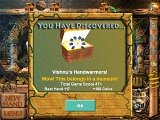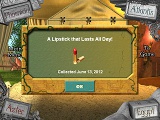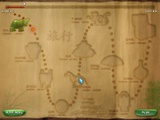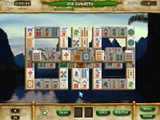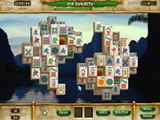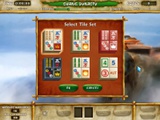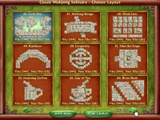





Mahjongg Artifacts (demo)
A demo installed by games bought in the supermarket, this game traces the
footsteps of an archaeologist collecting artifacts one fragment (and one game of
Mahjongg) at a time. Starting in China, he slowly works his way westwards
through various sites of ancient civilizations, the stone tilesets reflecting
the locale: traditional Chinese, followed by Greek letters and zodiac signs,
followed by Egyptian hieroglyphics. It begins with a tutorial which I can't
skip, and which tells me how this particular Mahjongg adaptation intends to bend
the rules: certain stones have wildcard functions, some can be combined with any
stone in their own suit, others with any stone at all. Clicking on the eye in
the bottom left will highlight only the stones that are free to remove, which is
handy as this is not always clear from the layout, and clicking on one of five
beads at bottom right will shuffle the stones, should I become stuck. Quickly
removing one pair of stones after another gains points, particularly if I don't
use the wildcard cheat but treat wildcard stones as ordinary pairs, and enough
points fill up a bead for a new shuffle round. Stones should ideally be shuffled
before I really get stuck, as being stuck costs a lot of points. The goal is to
free two golden stones; when those are paired, the level is finished no matter
how many stones are left. Each level begins with a rather crudely drawn comic
panel, and a new location being pinpointed on a world map. After the level is
finished, a fragment is added to a screen of artifact shapes that are filled in
bit by bit.
Both the layout and look of the stones are topical, changing with the locale,
the backdrop generally being a temple in a serene and lovely background. That it
is not necessary to pair all the stones is just as well, since every pair moves
to the bottom of the screen and then clops together with the sound of two bricks
hitting each other. There are four ways of cheating: wildcard stones, shuffling,
a hint button and an undo button, but the player is awarded "virtues" for
finishing a level without the last three. The game can be played in Story mode,
with the world map and comic panels, Classic Mode or Endless Mode. Classic mode
is unlocked after winning the first piece of artifact, while Endless mode is
unlocked after completing the first artifact.
Jewel Quest Solitaire
I downloaded all the Jewel Quest games I could find with
"Solitaire" in the name - not the original match-3 games, or the more recent
hidden objects games - to find the captivating card game that was part of the
Acer GameZone demos: one set in a witch-doctor's nightmare vision of the Amazon
jungle where, if the player loses the card game, a chest falls down a chute and
a snake rears up... or something. I couldn't check, because the first Jewel
Quest Solitaire wouldn't play because "your trial has expired" (yup, the first
game downloaded from Oberon balks over a game from Acer GameZone that was
uninstalled years ago). The official description is: "Match card suits to make
gold as you unearth buried cards and avoid cursed jewels on your trek through
the jungle!"
After buying and unlocking it, I saw that this game is not the Acer GameZone
demo; it plays the same, but is more visually static. (The game I was looking
for is Tri Peaks Solitaire To Go.) It is also not Solitaire as
I know it. The background music is very jungly, the cards look like either Aztec
or African masks, the backgrounds are organic, much wood and stone. It has a
"quest" and "just cards" mode. The quest story is that of an archaeology student
following in the footsteps of his uncle, who discovered a mythical hidden city
in South America, but returned traumatized and insane. Although the game is
mainly about cancelling cards against each other (and some layouts are
devilishly hard), in quest mode each card game is followed by a small match-3
game for bonus points.
The second game switches from Rupert, the now-married explorer,
to his wife (see introduction in first screenshot). Her husband missing, she
flies to Uganda to find him. Her journey is recorded in her journal, every
chapter of it helped along by a game of not-as-I-know-it Solitaire with the
cards arranged in various layouts (second screenshot), followed by a small
match-3 game with a limited number of tile switches in the right-hand corner;
the way the cards are played determines the number of tileswaps. I recognize the
cards, not only from the first game but also from the hidden objects game Samantha Swift and the Golden Touch: African mask
heads in red, purple, grass green, glassy blue, turquoise, brown and gold. The
game started with voiced text that I quickly clicked away, but it's mostly
African music and marketplace sounds, going nicely with the dusty-brownish,
again very organic graphics. For players who are not interested in the story,
there is also a cardgame-only mode.
A niggle: this game's story is even more outrageously unlikely than the last
one, and seems to have been written around the shapes of the card layouts: at
one moment the main character suddenly mentions her husband's scarf that she's
been carrying arround all this time, clearly to indicate that the last game's
layout was supposed to represent a loosely rolled-up scarf.
The first two games were small downloads (the smallest 20MB),
showing their age, but the third is noticeably bigger. Like the first games, it
has rousing background music - now in a different style since the locale is an
excavation site in Angkor, Cambodia - and a choice between story mode and
cardgame mode. Rupert Parks and his wife Emma Swimmingly (is there a joke in
there somewhere?) have run off to Africa again, leaving this excavation up to a
Fijian Oxford graduate who has to collect fragments of photographs. With his
lovely assistant Yumi who just happens to be a secret agent, pursued by a German
villain called Schtick (that has to be a joke!), he travels through five
locales, collecting artifacts by repeatedly playing a card game followed by a
match-3 game to win yet more fragments of artifact photographs which, when
assembled, will tell the player in riddle form in what order the artifacts
should be arranged, after which a secret safe is revealed - and that's where I'm
stuck, since I don't see any safe codes anywhere in the game, so I'll have to do
without the final bit of ending.
Unlike the previous games, this one plays (Klondike) Solitaire by the rules!
If the rules will allow for up to six suits in a game, wildcards (a great
solution that makes the game actually winnable, although there is a Re-deal
button) and powerups, to be won by putting a number of cards on their final
piles before drawing the next three cards. The number starts at 3 and goes up,
so I have to be careful not to start clearing cards away too soon or I might
miss powerups like the indispensable Unbury for cards that are covered in mud,
or a new Wildcard for some extra maneuvering room when I'm stuck. A winnable
Solitaire game is such a new thing to me that when the game asked me that since
I was going to win, did I want it to autocomplete, I thought: "No way! I want to
savour this." I answered this question with Yes for most subsequent games,
watching the cards move to their piles automatically with little tings as they
added up for more powerup points.
The powerups carry over into the match-3 game that follows. This too is more
strictly according to match-3 rules than in previous games. Again, the idea is
to turn as much as possible of the board to gold by deleting the tile on each
square, but this time the whole board must be turned to gold, and there is a
timer: a head that suits the locale (dragon, Anubis head etc.) with a slowly
retracting tongue. The timer stays the same, but the boards increase in size, so
that in the end I can't manage without the powerups, especially the one that
increases the timer. A nice new touch is the tiles showing an animation when
hovered over.
Being classical Solitaire, the card layout isn't as wildly varied as in the
previous games; it starts out boringly regular, although it does become
progressively stranger, with some card columns going upside down. Cardgame mode
is just the story mode card layouts without the match-3 game. In all, this game
is easier than the previous games, although just as entertaining. The music was
entertaining, too, starting with New Age music and jungle sounds and changing
with the locale, but still with the African-sounding victory whoops for each
successfully completed level.
I bought this game so long after installing the demo that I didn't get a code
to unlock it, since after 2012 the installation and playing of games is done
through a Game Manager, just as with "Games voor iedereen.nl" and Big Fish
Games. Grr.
Mahjong Memoirs from Romantic Discoveries Bundle - 3 in 1
This is a relaxed form of Mahjongg, in the form of lessons given in a
Japanese garden complete with tea and cherry trees in blossom, while traditional
Japanese music plays in the background. Interlude screens show haikus in
Japanese characters, translated to English. The player can choose from a number
of tilesets, some of which have to be unlocked by playing out the game. There
are two modes, "endless game mode" or "story mode". The latter starts with the
main character being taught the principles of the game by an old woman with a
past, and throughout the game, that past is revealed through items and letters
found. The lessons strikes me as "Mahjongg for suckers", but it does explain the
principle of "suits". My only niggle is that the letters are read aloud in
English with a Japanese accent (argh, voiceovers). Any other speech is shown in
text balloons.
Having bought and played out the whole game in story mode, unlocking every
room in the building down to the koi pond, I'm undecided whether to be sad at
the tragic end to a love affair, or irritated at this dotty old bird who leaves
her love letters around for strangers to find. This game bends the rules as
badly as Mahjongg Artifacts, and for each subsequent game the
tiles are piled higher and higher, until cheating is inevitable. Two tunes play
in the background, a suitably melancholy one and a happier one; more tunes, as
well as the extra tilesets, can be unlocked by playing fast enough (and cheating
hard enough) in endless game mode. Maybe one day, when I'm bored enough.
Tri-Peaks Solitaire To Go
The screen resolution of 640x480 pixels suggests this is an old game. The
painted scene shown before the first location suggests that it is also a funny
game. Discovering treasures like "the Dead Sea Trolls" and "a lipstick that
lasts all day" confirms this.
An intrepid archaeologist must find treasures worthy of a museum in four
different locations; the number of treasures to find increases exponentially
with each location. If successful, a fifth location will be unlocked without
treasures, but with coins and "tokens"; the other locations can also be replayed
for fun. The game takes its name from the three piles of cards that cover three
statues, king, queen and knave, dressed to suit the locale. If the pile covering
one of the statues is cleared away, that statue releases the gold on its head,
which rushes down its mouth and adds to the score total. Down the right side is
a pillar up which a snake crawls; this is a score multiplier. At the top of the
screen, the adventurer walks from chest to chest, being killed in comic ways if
the game is lost. There is an Undo button that only works for one card at a
time, so it's more to repair accidental flips than to retrace steps in a game
gone wrong. There are as many levels as there are treasures, and every level
plays the same: play a game successfully, and the animated little man at the top
walks the next part of the route while narrowly avoiding the death that would
otherwise befall him; if he stops at a chest (there are two chest-less stops) it
opens and gives random treasures: extra coins, or a special card, like the
Amazonian Wild Card, to help win the game. The golden chest at the very end
contains the museum treasure. It's possible to admire the treasures later in the
storage room, but they won't be neatly displayed on shelves; they remain crated,
and the player must click on the crate to see its contents pop up.
The game is much simpler than the various games in the Jewel Quest Solitaire
series and doesn't award points for things like putting on a card of the same
suit. There are no obstacles or different layouts, the cards have basic "Aztec"
faces for every location although their backs differ, and since gameplay is
"beat the same game n times in a row" it seems the game might be a tad tedious.
What completely relieves the tedium, though, is the little explorer at the top.
Losing is as much fun as winning, when he gets snapped up by a giant carnivorous
plant, or burns to crisp with a single stoic "ow". And then there are the
locations: most of them have a postcard appeal, but the Atlantis background is
as soothing to look at and listen to as an aquarium.
Mahjong Escape: Ancient China (demo)
At first sight, this game is a carbon copy of Mahjongg
Artifacts, except that it gives a nice tinging sound rather than a loud clop
when its tiles are matched, and that the setting is and remains China, since the
journey is through time, not space. Instead of collecting fragments of
artifacts, the player goes down the line of ruling dynasties, but otherwise the
principle is the same: free two golden stones by cheating your ass off, with
little rewards if you don't. After the first few simple levels, though, the game
introduces obstacles, of the kind I'm used to seeing in match-3 games. The
tileset doesn't change as the game progresses; there are different tilesets I
can choose from, but none of them are as pretty as the ones from Mahjongg
Artifacts.
The game has two modes, Dynasty Adventure (the story mode) and Classic. In
Classic mode, I can play without obstacles, although still with Hint, Undo and
Shuffle, using one of the more than sixty layouts to choose from.
Unlike Mahjongg Artifacts, I couldn't find this title, which was originally
installed as a game demo by the games bought at the supermarket, on the
CasualGames website. It is still available from Big Fish Games, either directly or via the
site of its creators, SpinTop Games.
Alice's Magical Mahjong from Fantastic Finds Triple Pack
Under construction.
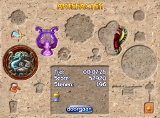
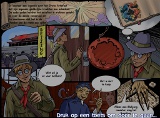
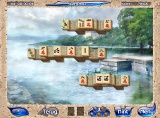
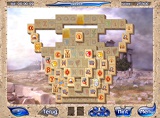
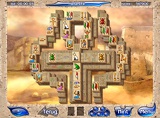
Jewel Quest Solitaire 2
Jewel Quest Solitaire 3
